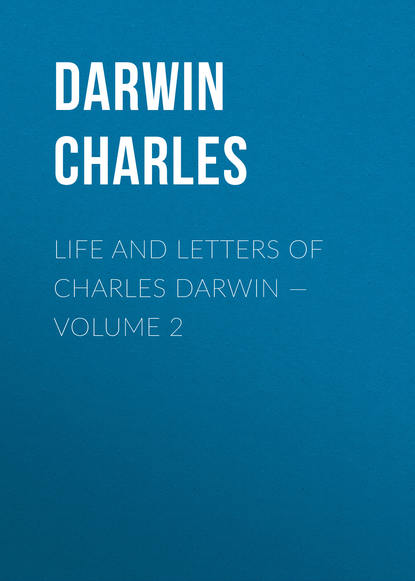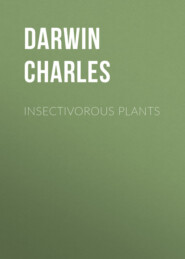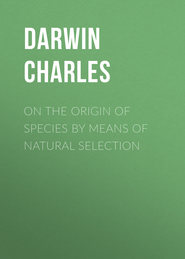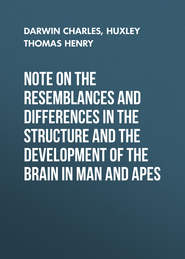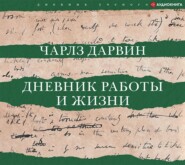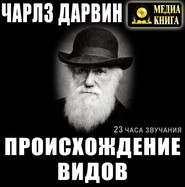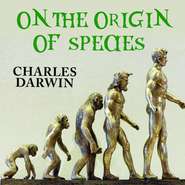По всем вопросам обращайтесь на: info@litportal.ru
(©) 2003-2024.
✖
Life and Letters of Charles Darwin — Volume 2
Настройки чтения
Размер шрифта
Высота строк
Поля
The letter above quoted continues:
"The excitement was now at its height; a lady fainted and had to be carried out, and it was some time before the discussion was resumed. Some voices called for Hooker, and his name having been handed up, the President invited him to give his view of the theory from the Botanical side. This he did, demonstrating that the Bishop, by his own showing, had never grasped the principles of the 'Origin' (With regard to the Bishop's 'Quarterly Review,' my father wrote: "These very clever men think they can write a review with a very slight knowledge of the book reviewed or subject in question."), and that he was absolutely ignorant of the elements of botanical science. The Bishop made no reply, and the meeting broke up.
"There was a crowded conversazione in the evening at the rooms of the hospitable and genial Professor of Botany, Dr. Daubeny, where the almost sole topic was the battle of the 'Origin,' and I was much struck with the fair and unprejudiced way in which the black coats and white cravats of Oxford discussed the question, and the frankness with which they offered their congratulations to the winners in the combat.]
CHARLES DARWIN TO J.D. HOOKER. Sudbrook Park, Monday night [July 2nd, 1860].
My dear Hooker,
I have just received your letter. I have been very poorly, with almost continuous bad headache for forty-eight hours, and I was low enough, and thinking what a useless burthen I was to myself and all others, when your letter came, and it has so cheered me; your kindness and affection brought tears into my eyes. Talk of fame, honour, pleasure, wealth, all are dirt compared with affection; and this is a doctrine with which, I know, from your letter, that you will agree with from the bottom of your heart... How I should have liked to have wandered about Oxford with you, if I had been well enough; and how still more I should have liked to have heard you triumphing over the Bishop. I am astonished at your success and audacity. It is something unintelligible to me how any one can argue in public like orators do. I had no idea you had this power. I have read lately so many hostile views, that I was beginning to think that perhaps I was wholly in the wrong, and that — was right when he said the whole subject would be forgotten in ten years; but now that I hear that you and Huxley will fight publicly (which I am sure I never could do), I fully believe that our cause will, in the long-run, prevail. I am glad I was not in Oxford, for I should have been overwhelmed, with my [health] in its present state.
CHARLES DARWIN TO T.H. HUXLEY. Sudbrook Park, Richmond, July 3rd [1860].
... I had a letter from Oxford, written by Hooker late on Sunday night, giving me some account of the awful battles which have raged about species at Oxford. He tells me you fought nobly with Owen (but I have heard no particulars), and that you answered the B. of O. capitally. I often think that my friends (and you far beyond others) have good cause to hate me, for having stirred up so much mud, and led them into so much odious trouble. If I had been a friend of myself, I should have hated me. (How to make that sentence good English, I know not.) But remember, if I had not stirred up the mud, some one else certainly soon would. I honour your pluck; I would as soon have died as tried to answer the Bishop in such an assembly...
[On July 20th, my father wrote to Mr. Huxley:
"From all that I hear from several quarters, it seems that Oxford did the subject great good. It is of enormous importance, the showing the world that a few first-rate men are not afraid of expressing their opinion."]
CHARLES DARWIN TO J.D. HOOKER. [July 1860].
... I have just read the 'Quarterly.' ('Quarterly Review,' July 1860. The article in question was by Wilberforce, Bishop of Oxford, and was afterwards published in his "Essays Contributed to the 'Quarterly Review,' 1874." The passage from the 'Anti-Jacobin' gives the history of the evolution of space from the "primaeval point or punctum saliens of the universe," which is conceived to have moved "forward in a right line ad infinitum, till it grew tired; after which the right line, which it had generated, would begin to put itself in motion in a lateral direction, describing an area of infinite extent. This area, as soon as it became conscious of its own existence, would begin to ascend or descend according as its specific gravity would determine it, forming an immense solid space filled with vacuum, and capable of containing the present universe."
The following (page 263) may serve as an example of the passages in which the reviewer refers to Sir Charles Lyell: — "That Mr. Darwin should have wandered from this broad highway of nature's works into the jungle of fanciful assumption is no small evil. We trust that he is mistaken in believing that he may count Sir C. Lyell as one of his converts. We know, indeed, that the strength of the temptations which he can bring to bear upon his geological brother... Yet no man has been more distinct and more logical in the denial of the transmutation of species than Sir C. Lyell, and that not in the infancy of his scientific life, but in its full vigour and maturity." The Bishop goes on to appeal to Lyell, in order that with his help "this flimsy speculation may be as completely put down as was what in spite of all denials we must venture to call its twin though less instructed brother, the 'Vestiges of Creation.'"
With reference to this article, Mr. Brodie Innes, my father's old friend and neighbour, writes: — "Most men would have been annoyed by an article written with the Bishop's accustomed vigour, a mixture of argument and ridicule. Mr. Darwin was writing on some parish matter, and put a postscript — 'If you have not seen the last 'Quarterly,' do get it; the Bishop of Oxford has made such capital fun of me and my grandfather.' By a curious coincidence, when I received the letter, I was staying in the same house with the Bishop, and showed it to him. He said, 'I am very glad he takes it in that way, he is such a capital fellow.'") It is uncommonly clever; it picks out with skill all the most conjectural parts, and brings forward well all the difficulties. It quizzes me quite splendidly by quoting the 'Anti-Jacobin' versus my Grandfather. You are not alluded to, nor, strange to say, Huxley; and I can plainly see, here and there, — 's hand. The concluding pages will make Lyell shake in his shoes. By Jove, if he sticks to us, he will be a real hero. Good-night. Your wel-quizzed, but not sorrowful, and affectionate friend.
C.D.
I can see there has been some queer tampering with the Review, for a page has been cut out and reprinted.
[Writing on July 22 to Dr. Asa Gray my father thus refers to Lyell's position: —
"Considering his age, his former views and position in society, I think his conduct has been heroic on this subject."]
CHARLES DARWIN TO ASA GRAY. [Hartfield, Sussex] July 22nd [1860].
My dear Gray,
Owing to absence from home at water-cure and then having to move my sick girl to whence I am now writing, I have only lately read the discussion in Proc. American Acad. (April 10, 1860. Dr. Gray criticised in detail "several of the positions taken at the preceding meeting by Mr. [J.A.] Lowell, Prof. Bowen and Prof. Agassiz." It was reprinted in the "Athenaeum", August 4, 1860.), and now I cannot resist expressing my sincere admiration of your most clear powers of reasoning. As Hooker lately said in a note to me, you are more than ANY ONE else the thorough master of the subject. I declare that you know my book as well as I do myself; and bring to the question new lines of illustration and argument in a manner which excites my astonishment and almost my envy! I admire these discussions, I think, almost more than your article in Silliman's Journal. Every single word seems weighed carefully, and tells like a 32-pound shot. It makes me much wish (but I know that you have not time) that you could write more in detail, and give, for instance, the facts on the variability of the American wild fruits. The "Athenaeum" has the largest circulation, and I have sent my copy to the editor with a request that he would republish the first discussion; I much fear he will not, as he reviewed the subject in so hostile a spirit... I shall be curious [to see] and will order the August number, as soon as I know that it contains your review of Reviews. My conclusion is that you have made a mistake in being a botanist, you ought to have been a lawyer.
... Henslow (Professor Henslow was mentioned in the December number of 'Macmillan's Magazine' as being an adherent of Evolution. In consequence of this he published, in the February number of the following year, a letter defining his position. This he did by means of an extract from a letter addressed to him by the Rev. L. Jenyns (Blomefield) which "very nearly," as he says, expressed his views. Mr. Blomefield wrote, "I was not aware that you had become a convert to his (Darwin's) theory, and can hardly suppose you have accepted it as a whole, though, like myself, you may go to the length of imagining that many of the smaller groups, both of animals and plants, may at some remote period have had a common parentage. I do not with some say that the whole of his theory cannot be true — but that it is very far from proved; and I doubt its ever being possible to prove it.") and Daubeny are shaken. I hear from Hooker that he hears from Hochstetter that my views are making very considerable progress in Germany, and the good workers are discussing the question. Bronn at the end of his translation has a chapter of criticism, but it is such difficult German that I have not yet read it. Hopkins's review in 'Fraser' is thought the best which has appeared against us. I believe that Hopkins is so much opposed because his course of study has never led him to reflect much on such subjects as geographical distribution, classification, homologies, etc., so that he does not feel it a relief to have some kind of explanation.
CHARLES DARWIN TO C. LYELL. Hartfield [Sussex], July 30th [1860].
... I had lots of pleasant letters about the British Association, and our side seems to have got on very well. There has been as much discussion on the other side of the Atlantic as on this. No one I think understands the whole case better than Asa Gray, and he has been fighting nobly. He is a capital reasoner. I have sent one of his printed discussions to our "Athenaeum", and the editor says he will print it. The 'Quarterly' has been out some time. It contains no malice, which is wonderful... It makes me say many things which I do not say. At the end it quotes all your conclusions against Lamarck, and makes a solemn appeal to you to keep firm in the true faith. I fancy it will make you quake a little. — has ingeniously primed the Bishop (with Murchison) against you as head of the uniformitarians. The only other review worth mentioning, which I can think of, is in the third No. of the 'London Review,' by some geologist, and favorable for a wonder. It is very ably done, and I should like much to know who is the author. I shall be very curious to hear on your return whether Bronn's German translation of the 'Origin' has drawn any attention to the subject. Huxley is eager about a 'Natural History Review,' which he and others are going to edit, and he has got so many first-rate assistants, that I really believe he will make it a first-rate production. I have been doing nothing, except a little botanical work as amusement. I shall hereafter be very anxious to hear how your tour has answered. I expect your book on the geological history of Man will, with a vengeance, be a bomb-shell. I hope it will not be very long delayed. Our kindest remembrances to Lady Lyell. This is not worth sending, but I have nothing better to say.
Yours affectionately, C. DARWIN.
CHARLES DARWIN TO F. WATKINS. (See Volume I.) Down, July 30th, [1860?].
My dear Watkins,
Your note gave me real pleasure. Leading the retired life which I do, with bad health, I oftener think of old times than most men probably do; and your face now rises before me, with the pleasant old expression, as vividly as if I saw you.
My book has been well abused, praised, and splendidly quizzed by the Bishop of Oxford; but from what I see of its influence on really good workers in science, I feel confident that, IN THE MAIN, I am on the right road. With respect to your question, I think the arguments are valid, showing that all animals have descended from four or five primordial forms; and that analogy and weak reasons go to show that all have descended from some single prototype.
Farewell, my old friend. I look back to old Cambridge days with unalloyed pleasure.
Believe me, yours most sincerely, CHARLES DARWIN.
T.H. HUXLEY TO CHARLES DARWIN. August 6th, 1860.
My dear Darwin,
I have to announce a new and great ally for you...
Von Baer writes to me thus: — Et outre cela, je trouve que vous ecrivez encore des redactions. Vous avez ecrit sur l'ouvrage de M. Darwin une critique dont je n'ai trouve que des debris dans un journal allemand. J'ai oublie le nom terrible du journal anglais dans lequel se trouve votre recension. En tout cas aussi je ne peux pas trouver le journal ici. Comme je m'interesse beaucoup pour les idees de M. Darwin, sur lesquelles j'ai parle publiquement et sur lesquelles je ferai peut-etre imprimer quelque chose — vous m'obligeriez infiniment si vous pourriez me faire parvenir ce que vous avez ecrit sur ces idees.
"J'ai enonce les memes idees sur la transformation des types ou origine d'especes que M. Darwin. (See Vol. I.) Mais c'est seulement sur la geographie zoologique que je m'appuie. Vous trouverez, dans le dernier chapitre du traite 'Ueber Papuas und Alfuren,' que j'en parle tres decidement sans savoir que M. Darwin s'occupait de cet objet."
The treatise to which Von Baer refers he gave me when over here, but I have not been able to lay hands on it since this letter reached me two days ago. When I find it I will let you know what there is in it.
Ever yours faithfully, T.H. HUXLEY.
CHARLES DARWIN TO T.H. HUXLEY. Down, August 8 [1860].
My dear Huxley,
Your note contained magnificent news, and thank you heartily for sending it me. Von Baer weighs down with a vengeance all the virulence of [the 'Edinburgh' reviewer] and weak arguments of Agassiz. If you write to Von Baer, for heaven's sake tell him that we should think one nod of approbation on our side, of the greatest value; and if he does write anything, beg him to send us a copy, for I would try and get it translated and published in the "Athenaeum" and in 'Silliman' to touch up Agassiz... Have you seen Agassiz's weak metaphysical and theological attack on the 'Origin' in the last 'Silliman'? (The 'American Journal of Science and Arts' (commonly called 'Silliman's Journal'), July 1860. Printed from advanced sheets of vol. iii. of 'Contributions to the Nat. Hist. of the U.S.' My father's copy has a pencilled "Truly" opposite the following passage: — "Unless Darwin and his followers succeed in showing that the struggle for life tends to something beyond favouring the existence of certain individuals over that of other individuals, they will soon find that they are following a shadow.") I would send it you, but apprehend it would be less trouble for you to look at it in London than return it to me. R. Wagner has sent me a German pamphlet ('Louis Agassiz's Prinzipien der Classification, etc., mit Rucksicht auf Darwins Ansichten. Separat-Abdruck aus den Gottingischen gelehrten Anzeigen,' 1860.), giving an abstract of Agassiz's 'Essay on Classification,' "mit Rucksicht auf Darwins Ansichten," etc. etc. He won't go very "dangerous lengths," but thinks the truth lies half-way between Agassiz and the 'Origin.' As he goes thus far he will, nolens volens, have to go further. He says he is going to review me in [his] yearly Report. My good and kind agent for the propagation of the Gospel — i.e. the devil's gospel.
Ever yours, C. DARWIN.
CHARLES DARWIN TO C. LYELL. Down, August 11th [1860].
... I have laughed at Woodward thinking that you were a man who could be influenced in your judgment by the voice of the public; and yet after mortally sneering at him, I was obliged to confess to myself, that I had had fears, what the effect might be of so many heavy guns fired by great men. As I have (sent by Murray) a spare 'Quarterly Review,' I send it by this post, as it may amuse you. The Anti-Jacobin part amused me. It is full of errors, and Hooker is thinking of answering it. There has been a cancelled page; I should like to know what gigantic blunder it contained. Hooker says that — has played on the Bishop, and made him strike whatever note he liked; he has wished to make the article as disagreeable to you as possible. I will send the "Athenaeum" in a day or two.
As you wish to hear what reviews have appeared, I may mention that Agassiz has fired off a shot in the last 'Silliman,' not good at all, denies variations and rests on the perfection of Geological evidence. Asa Gray tells me that a very clever friend has been almost converted to our side by this review of Agassiz's... Professor Parsons (Theophilus Parsons, Professor of Law in Harvard University.) has published in the same 'Silliman' a speculative paper correcting my notions, worth nothing. In the 'Highland Agricultural Journal' there is a review by some Entomologist, not worth much. This is all that I can remember... As Huxley says, the platoon firing must soon cease. Hooker and Huxley, and Asa Gray, I see, are determined to stick to the battle and not give in; I am fully convinced that whenever you publish, it will produce a great effect on all TRIMMERS, and on many others. By the way I forgot to mention Daubeny's pamphlet ('Remarks on the final causes of the sexuality of plants with particular reference to Mr. Darwin's work on the "Origin of Species."' — British Association Report, 1860.), very liberal and candid, but scientifically weak. I believe Hooker is going nowhere this summer; he is excessively busy... He has written me many, most nice letters. I shall be very curious to hear on your return some account of your Geological doings. Talking of Geology, you used to be interested about the "pipes" in the chalk. About three years ago a perfectly circular hole suddenly appeared in a flat grass field to everyone's astonishment, and was filled up with many waggon loads of earth; and now two or three days ago, again it has circularly subsided about two feet more. How clearly this shows what is still slowly going on. This morning I recommenced work, and am at dogs; when I have written my short discussion on them, I will have it copied, and if you like, you can then see how the argument stands, about their multiple origin. As you seemed to think this important, it might be worth your reading; though I do not feel sure that you will come to the same probable conclusion that I have done. By the way, the Bishop makes a very telling case against me, by accumulating several instances where I speak very doubtfully; but this is very unfair, as in such cases as this of the dog, the evidence is and must be very doubtful...
CHARLES DARWIN TO ASA GRAY. Down, August 11 [1860].
My dear Gray,
On my return home from Sussex about a week ago, I found several articles sent by you. The first article, from the 'Atlantic Monthly,' I am very glad to possess. By the way, the editor of the "Athenaeum" (August 4, 1860.) has inserted your answer to Agassiz, Bowen, and Co., and when I therein read them, I admired them even more than at first. They really seemed to be admirable in their condensation, force, clearness and novelty.
I am surprised that Agassiz did not succeed in writing something better. How absurd that logical quibble — "if species do not exist, how can they vary?" As if any one doubted their temporary existence. How coolly he assumes that there is some clearly defined distinction between individual differences and varieties. It is no wonder that a man who calls identical forms, when found in two countries, distinct species, cannot find variation in nature. Again, how unreasonable to suppose that domestic varieties selected by man for his own fancy should resemble natural varieties or species. The whole article seems to me poor; it seems to me hardly worth a detailed answer (even if I could do it, and I much doubt whether I possess your skill in picking out salient points and driving a nail into them), and indeed you have already answered several points. Agassiz's name, no doubt, is a heavy weight against us...
If you see Professor Parsons, will you thank him for the extremely liberal and fair spirit in which his Essay ('Silliman's Journal,' July, 1860.) is written. Please tell him that I reflected much on the chance of favourable monstrosities (i.e. great and sudden variation) arising. I have, of course, no objection to this, indeed it would be a great aid, but I do not allude to the subject, for, after much labour, I could find nothing which satisfied me of the probability of such occurrences. There seems to me in almost every case too much, too complex, and too beautiful adaptation, in every structure, to believe in its sudden production. I have alluded under the head of beautifully hooked seeds to such possibility. Monsters are apt to be sterile, or NOT to transmit monstrous peculiarities. Look at the fineness of gradation in the shells of successive SUB-STAGES of the same great formation; I could give many other considerations which made me doubt such view. It holds, to a certain extent, with domestic productions no doubt, where man preserves some abrupt change in structure. It amused me to see Sir R. Murchison quoted as a judge of affinities of animals, and it gave me a cold shudder to hear of any one speculating about a true crustacean giving birth to a true fish! (Parson's, loc. cit. page 5, speaking of Pterichthys and Cephalaspis, says: — "Now is it too much to infer from these facts that either of these animals, if a crustacean, was so nearly a fish that some of its ova may have become fish; or, if itself a fish, was so nearly a crustacean that it may have been born from the ovum of a crustacean?")





